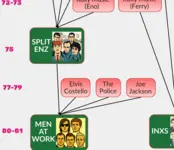Intro
From the pubs of Sydney to the art-rock stages of Auckland, the Australasian new wave scene punched far above its weight. These bands fused local color, sharp songwriting, and global trends into something distinctly their own. Split Enz brought theatrical wit, Men at Work sly humor and hooks, and INXS a bar-band swagger dressed in synth sheen. Here’s how three acts - plus a couple of scene mates - made Oceania an unmissable chapter in new wave history.
Explore the Synth & Swagger Members' Editions
Adam Ant vs the Media, Canadian New Wave, Female Empowerment in New Wave
And a new enhanced article every month

Split Enz
It’s 1975 in New Zealand, and a band called Split Enz is producing highly eccentric, progressive-inflected rock. Enter proto-New Waver Manzanera of Roxy Music fame, who nudged them in a more mainstream direction. Nevertheless, they maintained their bouncy sound, and elaborate and subtly clever lyrics.
I Got You
1980’s I Got You is a great middle ground between Split Enz’ early theatrical days and tight new wave edge. It compares to Elvis Costello and Squeeze with its angular guitars. A squirmy, repeated synth riff is a memorable hook, exceeded only by the declarative, farfisa-punctuated chorus. And while its more mainstream, Tim Finn’s vocals give the song theatrical flair.
Finn showcases his lyrical subtlety and prowess, a hallmark of Split Enz and later his next “Kiwi Rock” offering in Crowded House. Tim Finn has the girl of his dreams and claims “that’s all I want”. But he slowly slips doubt in with “Sometimes we shout but that’s no problem”. Sure, everyone has a few relationship issues. In the first chorus he says he’s frightened. But it carries a lot more gravitas by its third rendition (in the outro), thanks to lines like “Where do you go? I get no answer”.
Six Months in a Leaky Boat
Two years later Split Enz releases Six Months in a Leaky Boat. As with other new wave bands at the time, Split Enz’ angular guitars are smoothed over a bit. But this allows Finn to play more with vocal twists and turns. The synth mimicking the whistling of a shanty pirate was gold for me!
Leaky Boat is an homage to New Zealand’s geography and seafaring culture channeled through Finn’s lust to sail the seven seas. While it doesn’t have lyrical curveballs like I Got You, Leaky Boat is rich in metaphors and scene-painting. “The tyranny of distance didn’t stop the cavalier” colorfully illustrates Finn’s wanderlust, and “‘round the Horn if you dare” respects his Southern Hemisphere origins.


Men at Work
By the time Men at Work hit the scene, Split Enz had already proved that you could take Australasian eccentricity global — wrapping sharp pop craftsmanship around unusual rhythms, lyrical wit, and a distinctly regional sensibility. Men at Work inherited that balance, adding the Police’s reggae tilt and bar-band muscle.
Down Under
Men at Work’s ode to their home country is also the most well-known in the States. As I heard it on American radio in the late ‘80s and early ‘90s, I appreciated the memorable, brief drum and flute intro. And vocalist Colin Hay’s smooth vocals that spike at the right moments, reminiscent of Sting’s dynamics.
Now at least I got that the song is about Australia. During Down Under Hay meets a nice guy who offers him a vegemite sandwich. It bugged me that I had no idea what vegemite was until I looked it up and saw it was (an Australian snack). Clever! But that’s the tip of the iceberg with the Australian references. According to Hay, the locals revere their beer (sometimes to the point of chundering). And that “men plunder” line? Sounds to me like a sly nod to how outsiders - historically and today - have a knack for helping themselves to Australia’s riches. Overkill
On their next album Cargo, Men at Work call back to their earlier Who Can It Be Now, both sonically and lyrically. For example, Greg Ham’s saxophone is once again prominent and delivers the biggest hook of the song. Hay is a little more mellow with his vocals than on Be Now but still cranks it up when needed.
Lyrically, Overkill trades the hop-along (sorry!) swagger of Down Under for the claustrophobia of Who Can It Be Now. Though Overkill leans more free-floating anxiety than paranoia, but its also described in vivid detail with lyrics like “alone between the sheets only brings exasperation”.


INXS
Like Depeche Mode, INXS didn’t totally bloom until the late ‘80s. 1987’s Kick was a monster that spawned four US top 10 singles. And while that and later albums leaned heavily on Jagger swagger and Rolling Stones rock, INXS had strong new wave and bar-band pedigrees. They spent their formative years grinding in Australian pubs, honing a tight, kinetic stage presence. Early on, they mixed sharp rhythmic interplay, punchy sax, and sly melodic hooks that gave their songs an unmistakable spark. And while they were never “weird,” INXS embraced quirky lyrical turns — a trait Split Enz had used to give new wave its Oceanic stamp.Don’t Change
With 1983’s Don’t Change, INXS respected both their bar-band grit (Hutchence’s booming vocals) and new wave sleekness. Indeed, the cool synth hook in the chorus and other lingering synth riffs give it just the right level of sheen.
Don’t Change is a straight-up feel-good song: in it, Hutchence falls in love. But the “don’t change” plea in the chorus is a bit of a twist while keeping it catchy. And the verses “resolution of happiness” and the rhyming “execution of bitterness” show INXS had lyrical chops to match their hooks.
Original Sin
The following year, INXS started trading in their bar-band cred for Rolling Stones curves with tracks like Original Sin. For example, Hutchence’s vocals have more bluesy slides rather than the powerful, straightforward delivery of bands with similar bar-band pedigrees (like Huey Lewis and the News). That said, there’s still catchy synth notes (like in the intro) that make it fit comfortably alongside other 1984 new wave hits.
The lyrics — “dream on white boy, dream on black girl” — tackle race and desire head-on, making it one of the most socially charged singles of their career. Nile Rodgers’ (of Duran Duran and B-52s fame) production smooths it into a danceable, radio-ready sheen, proving INXS could be both provocative and irresistible.


Honorable Mention
While Split Enz, Men at Work and INXS offer a great view into Australasian new wave, there are other bands from that area that come in at different angles. Give these a spin if you can:
- Icehouse: they specialized in glacial synth textures and sleek, moody pop that could have come straight from Berlin or London — yet Iva Davies’s songwriting often carried a quiet Australian melancholy. Songs like Great Southern Land made that local perspective literal, wrapping wide-open landscapes in icy minimalism.
- Pseudo Echo: they brought a flashier, more neon-coated take on new wave to the mid-’80s, blending funk grooves with razor-edged synth hooks. Their synth dancy remake of Funky Town may have been their calling card, but original tracks like Listening kept one foot in the Antipodean scene.
Outro
Australasia’s new wave bands didn’t just copy London or New York — they exported a style rooted in their own quirks, landscapes, and wit. Split Enz’s theatrical craft, Men at Work’s playful punch, and INXS’s sleek swagger each tell a different side of the story. Icehouse and Pseudo Echo added cool textures and neon gloss to the mix. Together, they proved that even from the far side of the world, new wave could feel both universal and unmistakably local.
Adam Ant vs the Media, Canadian New Wave, Female Empowerment in New Wave
And a new enhanced article every month









